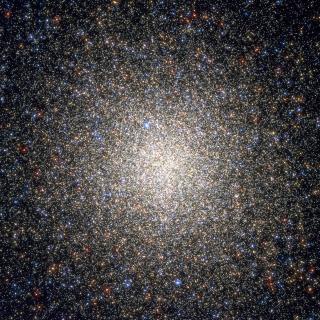Bibcode
King, I. R.; Bedin, L. R.; Cassisi, S.; Milone, A. P.; Bellini, A.; Piotto, G.; Anderson, J.; Pietrinferni, A.; Cordier, D.
Referencia bibliográfica
The Astronomical Journal, Volume 144, Issue 1, article id. 5 (2012).
Fecha de publicación:
7
2012
Número de citas
76
Número de citas referidas
70
Descripción
We revisit the problem of the split main sequence (MS) of the globular
cluster ω Centauri, and report the results of two-epoch Hubble
Space Telescope observations of an outer field, for which proper motions
give us a pure sample of cluster members, and an improved separation of
the two branches of the MS. Using a new set of stellar models covering a
grid of values of helium and metallicity, we find that the best possible
estimate of the helium abundance of the bluer branch of the MS is Y =
0.39 ± 0.02. For the cluster center, we apply new techniques to
old observations: we use indices of photometric quality to select a
high-quality sample of stars, which we also correct for differential
reddening. We then superpose the color-magnitude diagram of the outer
field on that of the cluster center, and suggest a connection of the
bluer branch of the MS with one of the more prominent among the many
sequences in the subgiant region. We also report a group of undoubted
cluster members that are well to the red of the lower MS.
Based on observations with the NASA/ESA Hubble Space Telescope, obtained
at the Space Telescope Science Institute, which is operated by AURA,
Inc., under NASA contract NAS 5-26555.
Proyectos relacionados

Vía Láctea y galaxias cercanas
El objetivo general del Proyecto es el estudio de la estructura, historia evolutiva y proceso de formación de galaxias a través de sus poblaciones estelares resueltas, tanto a partir de fotometría como espectroscopia. El proyecto puede dividirse en cuatro líneas principales: I. Historia de formación estelar en el Grupo Local. El objetivo de esta
Martín
López Corredoira